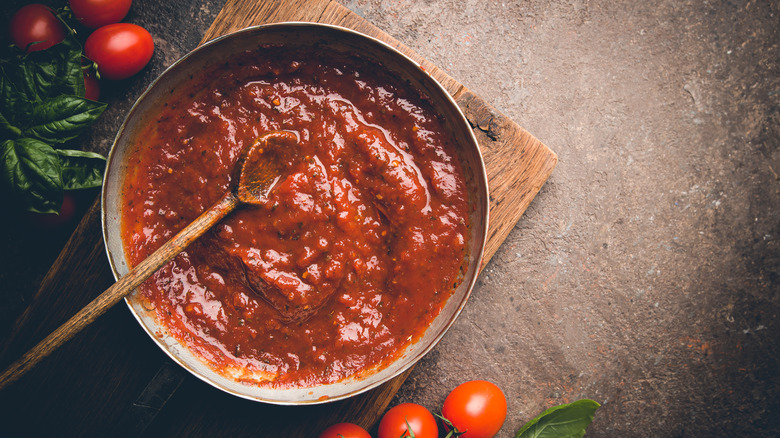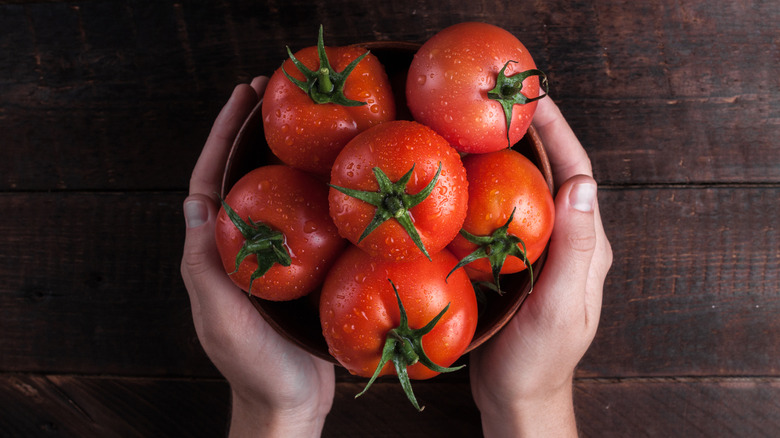Raw Versus Cooked Tomatoes: Which One Is Better For You?
Tomatoes can be a valuable addition to a healthy diet. But how we prepare and consume tomatoes may actually alter their health benefits. Clinical and epidemiological studies have long shown associations between tomato consumption and protective effects against chronic conditions like cancer. But cooked tomatoes are being studied for even more potent health benefits and their role in various disease prevention strategies. For example, a 2018 meta-analysis study published by Prostate Cancer and Prostatic Diseases pulled data from over 260,000 participants and concluded that cooked tomatoes and sauces offered a greater prostate cancer risk reduction over raw tomatoes. And it's not just the act of cooking tomatoes that increases their health benefits. One study found that tomato products like tomato juice, tomato paste, tomato puree, and tomato ketchup increased lycopene bioavailability, thus lowering biomarkers of oxidative stress and carcinogenesis in type 2 diabetes and prostate cancer patients respectively, via European Journal of Clinical Nutrition. Experts warn that it's important to consider the added and often high sodium content of tomato products, particularly for those watching their sodium intake (via SFGate).
Cooking and bioavailability
Some tomato products and cooking preparations offer greater bioavailability of key antioxidants and phenolic compounds over whole, raw tomatoes. For example, naringenin is a highly abundant polyphenol in tomatoes, shown in studies to lower cholesterol and boost antioxidant activity, via Journal of Nutrition. Cooking tomato paste was found to promote bioavailability and naringenin absorption in men. Additionally, chlorogenic acid is a phenolic compound highly associated with treating metabolic syndrome and boosting antioxidant and anti-inflammatory activities. A study conducted by the European Journal of Nutrition found that by cooking tomatoes, it significantly increased the tomato's chlorogenic acid plasma levels. Another study conducted by the Asia Pacific Journal of Clinical Nutrition found that cooking tomatoes in olive oil actually increased plasma levels of lycopene thus increasing its bioavailability upon consumption. Lycopene belongs to the carotenoid family and its dietary intake has been associated with prevention of chronic diseases such as cancer, asthma, and cardiovascular disorders, via Turkish Journal of Pharmaceutical Sciences.
Other cooking considerations
While a great deal of evidence suggests cooking tomatoes has important health benefits, there are potential drawbacks as well. Researchgate found that when boiling and frying tomato pulp, vitamin C content decreased. Additionally, the longer the tomato was exposed to heat, the greater the decrease of vitamin C content. Frying had more adverse effects on vitamin C content than boiling did. With specific regards to vitamin C, it's suggested that less exposure to heat can preserve vitamin C content. While heat can damage valuable vitamin content of tomatoes, heat can also provide practical protections against food-borne illness. For example, raw tomatoes carry a greater risk for bacterial poisoning, like salmonella, due to the fact that salmonella is destroyed through the cooking process. Interestingly enough, researchers are trying to determine the lowest temperature and cooking time that destroys salmonella, to preserve food's nutritional quality. Researchers now suggest that salmonella may die at around 120 degrees F (via Penn State Materials Research Institute).



